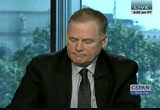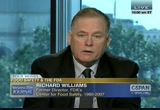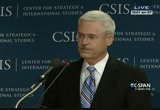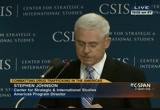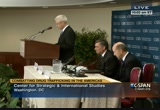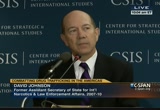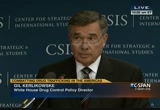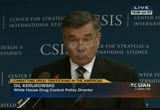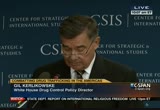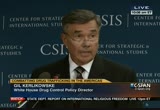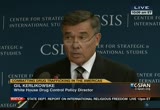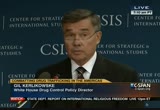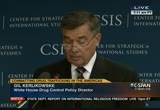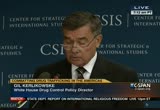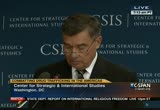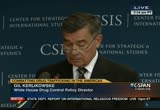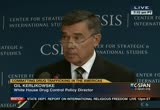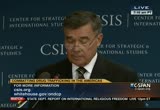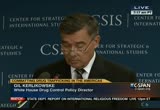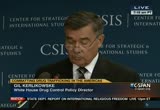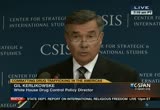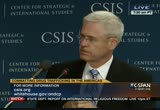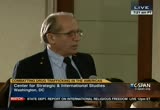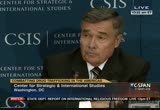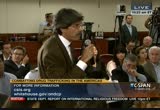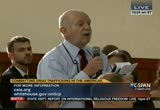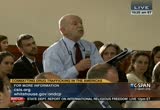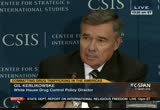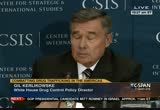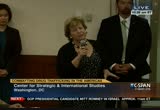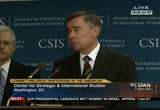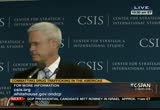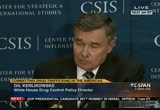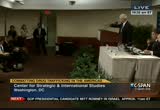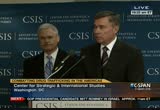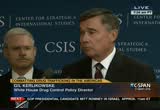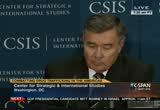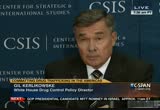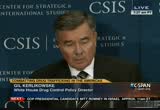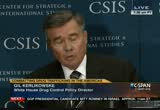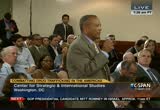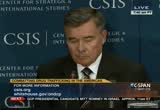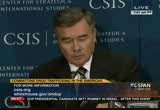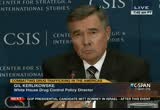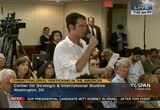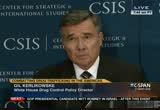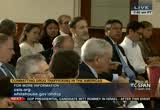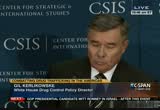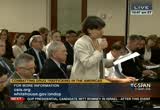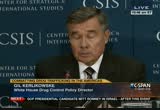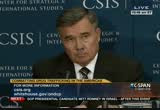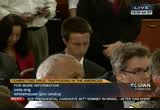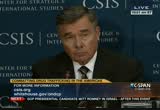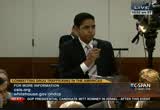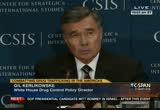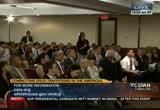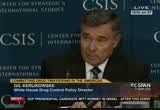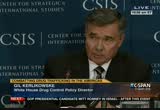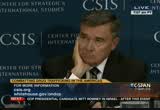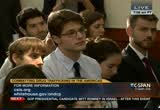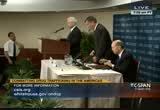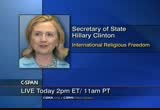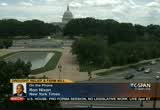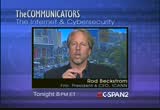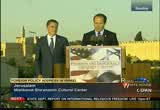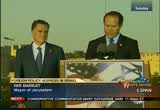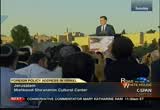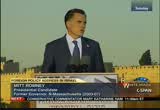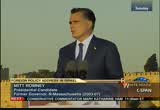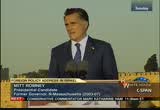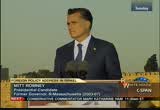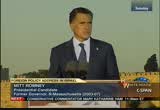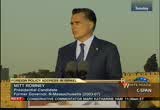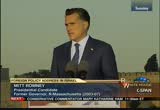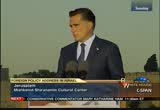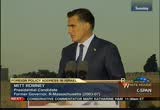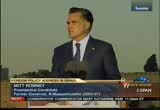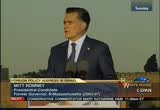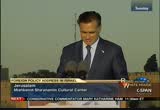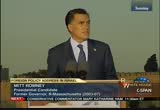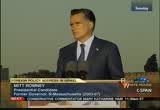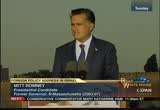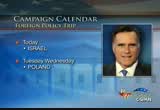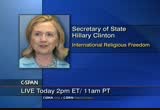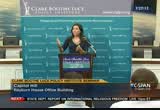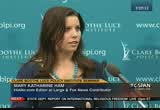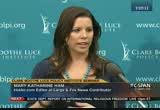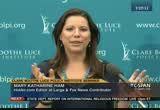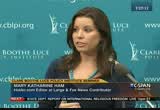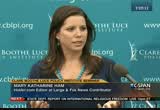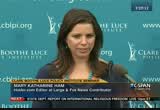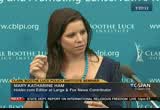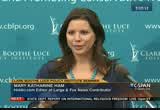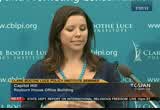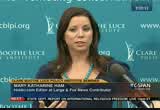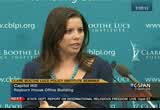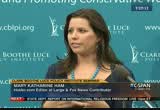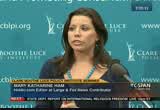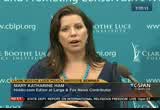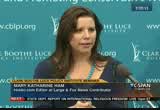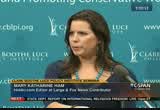tv Politics Public Policy Today CSPAN July 30, 2012 10:00am-12:00pm EDT
10:00 am
labelling issue where there is not enough space on the can or the packages meet. i was just wondering what would be wrong to poking into the bar code? everyone has a smartphone record -- to put a bar code on they could cut the other bar codes to the scanner. i am not a smart man. i know that much. it would only take up 1 inch of space. this is serious. they're putting stuff in our evenm that they haven't checked. >> that is an excellent idea. you can link a lot of information to the bar code. it is what is allowing us to trace this back. we had radio added vacation frequency tags.
10:01 am
it contains all the information from. where the food came com is a good idea that they could scan. host: we have been talking about food safety. richard williams, former director of food safety. thank you for coming in and talking with us. that is all for "washington journal" thank you for joining as. we will now go to csis for a drug policy in america is forum. >> could morning.
10:02 am
-- good morning. if we all could take hours seats. i live like to welcome you to . in the director of the americas program. it is great to see this turn out on a monday morning. we have a special guest and a compelling program. it is a privilege to bring this program to you here today. before we get started, a couple of administrative details. please turn your cell phones to vibrate mode. during the question and answer session, i ask that you raise your hand so that one of our staff members can get a microphone over to you so that we can all hear the question that you have are the brief commentary that you may have. when you do speak, it could you please identify yourself and the organization that you represent?
10:03 am
before we introduce our guest, i like you to think about the frame of reference is we have in dealing with narcotics. in 1970's we started talking about the war on drugs but we do not often talk about the war on crime which as been with us since the beginning of recorded history. we understand this is a management issue. i would ask you to keep this in mind as you hear a director gil kerlikowske's words. at ast csis -- have asked csis' director for the introduction today. he has been the assistant secretary of state for international narcotics and law enforcement affairs. from 2007-2011.
10:04 am
ambassador johnson, would you do the honors? >> it is a pleasure for me to introduce gil kerlikowske. he is a colleague and a friend. he is the director of the national drug control policy which makes him a responsible for coordination of all of our nation's counter narcotics policies and makes them the coordinator of a desperate -- diverse range. he is a career in law enforcement officer having grown up in law enforcement in st. petersburg and subsequently served as the commissioner of police in buffalo and was chief of police for nine years in seattle where he had an extraordinary record of lowering crime and engaging with the
10:05 am
community. it was my pleasure to work with him here in washington and to be coordinated by him. he brought a new breadth of leadership to his position. he had one of those signal achievement of a great leader. he brought a lot of great people with him and imagination to the position which is really impressive. it is my pleasure to welcome to the platform here. [applause] >> thank you. good morning. it is a great pleasure to be back. it is really wonderful to be introduced by a person i have a lot of admiration for in the very difficult task he undertook and also the leadership steven provides.
10:06 am
i really very much appreciate the opportunity and relationship. csis is an important leader. i am delighted to discuss with you the work of the obama administration. i have some information to stare with you about cocaine production. i want to take a few moments and talk about the state of drug policy. last month i had a wonderful opportunity to lead the american delegation for the international conference on the global drug problem. it was hosted by the president and there were 500 individuals. i joined the delegations from five continents to share america's approach to drug use and to hear about drug policy in other countries and to discuss
10:07 am
it at length. what are the obstacles each country faces? what is the best path forward? as i sat with leaders of more than 60 nations from across the globe, i realize our areas of agreement far outweighed our differences. we were all united in the ensuing drop policies that are balanced and realistic in the focus on the public health and the safety of our people -- citizens. there is considerable discussion here and in latin america about uruguay's a move to legalize marijuana. the statements would have suggested the worldwide legalization was a foot. it was not clear what kind of telling the summit will take. the problems caused by drought in latin-american are frustratingly complex. the public discourse on these
10:08 am
issues drives around the simplicity of sound bites. a drug problem is complex. it requires a complex solution. i was pleased to see the world leaders agree on a three-pronged approach. although it does not lend itself to sound bites, it is holistic, it is nuance, and it is a strategy that will be affected. institutional support for alternative development is critical. on a number of trips i had the opportunity to meet with many people who have been engaged, whether it is in fish farming or working in other alternative crops. the success has been amazing. in not only reduces the amount of drugs coming out of latin america but in shores they farmers who make their living from illicit crop production have a viable alternatives to
10:09 am
support their families. these farmers have to be protected as they grow alternative legal crops. that is why this administration has devoted nearly $1 billion to alternative development programs during the last three years. they provide economic incentives, increased security to farmers. the global drug policy community is committed to reducing the supply of drugs but our limitedic phocifocus is not to latin-american. the united states was in nevada trying to disrupt the flow of cocaine to europe. because we know criminal organizations will exploit political rest and vulnerable
10:10 am
countries, we have to be nimble and our response. another reason it cover the evolution of the drug countries other countries were thought of as transit companies. they are artificial distinctions. drug-trafficking pays their networks and drugs and not in cash. drug consumption is of great concern. it strains the public health services in these nations that are all too often ill-equipped to help people who need treatment for addiction. the third prong of the global approach is reducing the demand for drugs. that is an important part of the administration's strategy. i know you have read the 2012 strategy and probably have your copies with you. they are still available. the president requested more money for treatment and prevention programs that he did
10:11 am
for u.s. law enforcement. it is a fact often over let -- overlooked. we have spent $31 billion to support drug education and treatment programs. we're told that the united states and europe are the only areas where drug consumption is a major problem. in the united states we are engaged in an unprecedented effort to reduce the drug consumption through prevention treatment and recovery programs. we routinely see evidence of this where the problem has not been visible before. latin american countries have their own drug use. just before the summit in peru i visited what guatemala and visited a drug rehabilitation center. the women in the treatment center were from all over the country. only 12 women were able to stay
10:12 am
there. the price of treatment was $200. it was a small but sent to meet a public health need that is not confronted by national borders. in many cases the women treated had made enormous sacrifices to be there and their attempt to find treatments have been woefully ltd. before they arrived. my point is drop consumption is not a european or u.s. problem. it is a growing social problem in places we want mistakenly called transit countries. as we look for solutions to the global drug problem we must understand and recognize that the united states is not only capable of exporting helicopters or training narcotics units. we lead the world and evidenced based treatment. we do export acknowledge. through the initiative, we are
10:13 am
helping to create safe streets in latin america and support democratic institutions. casri funding also goes to programs for use to provide healthy alternatives to substance use. during my trip to guatemala i visited a youth drug prevention program. it was built on the framework of a u.s. program and developed into a program that reflected the culture in guatemala. the combination of american expertise and the cultural influence created a youth program suited to the needs of that country's young people. by exporting u.s. expertise and encouraging partner nations to make partners of their own, we can retreat similar programs in countries where drug use is increasing.
10:14 am
this points to one conclusion. the drug control community must find ways to work together and increase our cooperation. both in cutting the supply of drugs and reducing demand for them. i am pleased to report there is a significant amount of international solidarity on this matter. i told you i did have some good news. while there is more work to do, multiple across the board indicator showed that both cocaine production and u.s. cocaine consumption are declining. show in 2011s wer cocaine production in colombia dropped 25% from 2010 and 72% from 2000 to 01. potential production appear cocaine -- of pure cocaine is down. the lowest production potential level since 1994.
10:15 am
it is the first time since 1995 that columbia is producing less cocaine than peru or bolivia. what about our own consumption tax since 2006 -- consumption tax since 2006, cocaine use has decreased b. fewer arrestees are testing positive for cocaine. all 10 of the site across the country where this is tracked showed a decrease in 2011 compared to 2003. let me add a little context. it did not happen overnight. there is a sustained effort for nearly a decade. steady pressure across more than one administration in both of the united states and in colombia. it did not happen to the efforts made by the united states.
10:16 am
this is a partnership by the united states and colombia. it was the result of a balanced approach that involves a these integrated steps. the results are historic and have implications not just for the united states and the western hemisphere but also globally. the security threat we face in 1999 is gone. it has been accomplished without offsetting results elsewhere. we do not just have a safer columbia. ombia.e a vibrant colum colombia is committing its own resources to help its neighbors for your information exchanges and regional leadership. these lessons provide a model for dealing with challenges
10:17 am
they're out the world, particularly in central america. these numbers should not distract us from the fact that transnational organizations are clearly a threat to civil society everywhere. we have seen that in our southern neighbor of mexico. the administration contends the gruesome drug-related violence. it is committed to partner with the mexican government to diupt the cartels that commit such brutality. these pose a significant challenge. they do not just pray and citizens -- on citizens but they diversify through drug trafficking, sex trade, corruption, and terror wherever they operate. it there and the business for money and power. there is no limit to the schemes they will employ to extract illegal proceeds. in interview with pbs in may,
10:18 am
the head "once the dominating cartel establishes territorial control it turns to the most probable part of its business, selling protection. kidnappings, piracy, sale of organs, prostitution, and they will turn to anything illegal that makes money. the profitability of drugs is quite low compared to the profitability of these other areas." the united states take our response ability to dismantle organizations operating within our own borders very seriously. last year united states law enforcement agencies dismantled 612 drug-trafficking organizations that were on the attorney general target list. that focuses on a major drug- trafficking organizations that operate in our own country.
10:19 am
we have interagency task forces operating in every part of the country to disrupt a major drug- trafficking distribution networks within the united states. we welcome the dialogue on the best tactics to address the threat posed by transnational criminal organizations. we recognize it is appropriate to continue to examine what works best. transnational criminal networks would not disappear if drugs were made legal. these organizations do not derive all of their revenue through drugs. they would not simply disband if drugs were legalized. institutions like csis play an important role in developing a rational approach to the international drug is you. too often we continue to face this polarized debate. this administration is committed to the way forward.
10:20 am
legalization is not a policy nor is locking every offender up. our focus is on the science of addiction and tackling the international security challenge posed by transnational criminal organizations. there is not a simple answer to the global drug issue. it is complex. it threatens the security of people everywhere regardless of their citizenship. i am grateful for the opportunity to provide some insight into the landscape. thank you very much. [applause] >> now we come to that part of the program where we have questions and answers. if you have a question, raise your hands. we will get a microphone to you. keep your question shore so we
10:21 am
have time for more than just one. i think we had one go up here. you are next. >> i am a retired economic analyst who graduated from college before marijuana showed up on campus. i was interested in drug policy when i went to grab school a few years later. pretty clear that marijuana is not more dangerous than alcohol. we know it is a far less dangerous drug and alcohol or tobacco. those two drugs are killing more than half a million americans every year. the number of marijuana desk is so low we cannot even -- and deaths are so low it cannot even conduct studies. you're sitting message to our kids that the only drug we need
10:22 am
to worry about is marijuana. i think that is a tragic mistake. >> we have a comment? >> i think we concentrate on a wide array of drug issues. we clearly do not try to prioritize which is more dangerous than the other. it is a huge mistake to think that marijuana is a benign substance. nearly is not. it is not -- it clearly is not. , station is not an answer. when an illegal substance becomes legal we know that the use increases. it is not like the country is equipped to deal with the number of people that have alcohol problems the suffer from the effects of nicotine. i do not think we're in the position to take care of the people. who become addicted to
10:23 am
marijuana. we also do not think that locking everyone up is an answer. we do not think there is an end in sight. the officers in seattle that reduced time for their work never thought they were going to work themselves out of a job. legalization does not plan to solve our drug problem. -- is not going to solve our drug problem. >> good morning. we offer our support as an organization by the 34 offices in the different countries to support every initiative of the government to improve the view
10:24 am
of this problem. we are very worried about the actions in every country. we are in a better situation to support every initiative that you are trying to go ahead with. >> thank you very much. the public health approach is clearly critical and important to dealing with this problem. thank you. >> we have one here. >> i am mark schneider. thank you for the presentation. i think one has to step back and ask, given an optimistic presentation, why is it that most of the latin american heads of state were not convinced and
10:25 am
have not been convinced and were quite critical of the current drug policy? many of the previous head of state in the blue ribbon panel similarly had questions. i think the question's good to each of the three areas. -- go to each of the three areas. they do not see alternative development. on the question of drug production, they see the balloon effect. there has been a rise in peru and bolivia. it averages between 180, 000 and 210,000 in cultivation. the third is in terms of what you are discussing which i think is quite important. it is the question about how you
10:26 am
deal with the crime problem you see in mexico right now. and the rising violence there. would it not make sense for the u.s. government to support something similar to what it latin-american as did? and independent panel that would provide an independent view. an independent review and study that would present their findings to the u.s. government. >> there is a lot there. a couple of things that are important. the oas is taking on this issue. this administration has never
10:27 am
been shy about engaging in debate. the president and vice-president have made it clear where they stand. what is missed particularly the in mexico is that oftentimes people want to use colombia as a temp but -- as a template. they're well over a decade in making these changes. if the numbers that are holding showing the reduction in violence, it gives some proof that this is not happen in a quick fix. americans are very happy to solve every major problem in 30 minute television show. we want quick answers. i do not think when it comes to taxes or the fact that when i
10:28 am
listen to the 61 representatives of the country, people still in office, they are responsible for the safety and security of the people they represent. i did not hear any appetite for legalization. >> good morning. thank you for your remarks. i wanted to dig a little deeper on what you said about alternate development and the solution. one of the things that came out of the work in colombia is that in order to be successful you needed security in these regions to even promote development to get crops to market. the success of colombia was a security environment. hal do you as a coordinator
10:29 am
create the enabling environments if the goal is to reduce stress. you need these kinds of stable area's first. i was interested in pursuing that. >> from a long career, almost four decades, you did not change the level of crime unless you first that safety and security going into it. then it was the people themselves that felt more safe and more secure that made the changes that were necessary to save the crime was not welcome and drug dealing in our neighborhoods. that is a historic pattern of the violence and crime reductions that have occurred here in divided states. i think that pattern with clearly called in alternative crop. in talking to the people there,
10:30 am
the family members were so pleased. there was safety and security. at times they said they have less money in their pockets, the fact that they could take care of their family and the state and security and the crop would not be taken by the government made a huge amoun of differ we work very closely. the best example is the colombia national police. i am very heartened by what i have heard about mexico. the retired general is a key adviser to the new incoming president. i think we want to be a strong partner of safety and security. thank you. >> you highlighted the success
10:31 am
that colombia has seen in reduction of cocaine. what could the smaller nations of central america learned from the colombian experience? is there a danger that some of these countries are taking a heavy handed approach that might backfire? >> rather than speak about each of those countries with a different perspective, i think a couple things are worthwhile and colombia. the citizens were taxed at a level that they were able then to provide the infrastructure and security that made a huge
10:32 am
difference. when you listen to president called thrombosis speech at the library of congress -- president speech at theron's library of congress, these countries could make the important indication that is needed to infrastructure and reducing corruption. it is really the foundation for this. i do not have sufficient detail about is the approach heavy- handed or does it violate human rights. and talking to a number of people in a variety of my trips, the protection of people and human rights has been something they have spoken to me about that they are quite proud of in many ways.
10:33 am
>> we have one year and then we haare going to start working our way over to the other side. >> thank you for your top. you mentioned that since 2006 the number of cocaine users has declined by 39%. what part of that is due to government efforts? many people know an epidemic crested and people quit because they realize top awful it was. how much of that was due to government efforts? >> if i knew the answers to that i'll become a highly paid consultants. i think it is two parts. one is that clearly reducing supply is incredibly helpful to reducing the demand here in the
10:34 am
united states. when the product is less pure or difficult to obtain comment that is important. it is not just in colombia. the second thing i think is important has been the educational efforts that are often not given the credit to help reduce that level of consumption here in united states. i have spent a lot of my career in the african-american communities as several large cities. you can understand that their neighborhood word of mouth, information, devastation that cocaine caused, the crack cocaine was not anything that people were interested in. they would very much move away from it. i think it really talks about this balanced strategy they have to educate people. he also have to provide treatment resources.
10:35 am
people recover and go back to their families and being productive citizens. you have to do the enforcement. if you were to ask me what actually had the most impact, i would not have that answer. >> in the center. >> i am a master's student at georgetown. speaking of your remarks of the general view is an adviser. have your office been in contact with anyone from the new administration in mexico? how do think that opinion will change the drug were there or policy in that country? quite since he does not take
10:36 am
office for several months and many of these things are still forming and there are lots of places within the bureaucracy of the united states government from the department of state to national-security staff that are involved with this, i would only tell you that from all of the statements that i have read in everything that i have heard, i am very encouraged. they will continue to look at this. the president calderon has said that these cartels can often replaced legitimate government. he told me specifically of one time. he told me there is a strong reason for me to take this spirit the people of mexico elected people and i have appointed people to run this country. he said drug trafficking organizations and criminal cartels have no business trying to run the country.
10:37 am
in my estimation he has been incredibly courageous in taking them on. his life has been incredibly strategic about making drug prevention and drug treatment a signature effort during her entire time as first lady. dresss lady in the yellow all the way in the back. >> some people and colombia the violence takes precedence. how do you get cooperation with colombia? >> the first part in recognizing the reductions in the forces and what has been done to them is important.
10:38 am
they are certainly able to operate as a criminal gangs can operate in some of our locales throughout the united states. the fact that the law enforcement initiatives have been so well structured and bought out in the training and the equipment is particularly important. it is probably inappropriate for me to comment on president and the relationship of colombia other than to say i think there are a number of countries admire what has occurred in colombia from a safety and economic standpoint. have majordents
10:39 am
trafficking important efforts along with the fact that they have also clearly embraced so many community-based organizations. we have representatives that are here that have spent in or didn't amount of time saying here is what we have done to strengthen bill local communities to reduce this problem >. >> thank you for those inside for remarks. i am with community anti-drug coalition of america. it is a strategy that is about 30 years old certified by the united nations. for the last six years we have been working in countries to build community-based, multi- sector organizations.
10:40 am
the recession has been unbelievable. colombia has been one of the real success stories. , at ellso been to brazil salvador, you name it. we're now working in asia and about six countries in africa. my comment is the demand strategy when embraced at the community level is having a tremendous impact. we are about to have an evaluation that has gone on for the last two-years in peru that says when this is in place you can reduce not only consumption but also crime as well. my hope would be that the u.s. would continue to have a very strong demand perspective in this policy both domestically and internationally. >> thank you.
10:41 am
i think president obama's dedication to community building and strengthening community applies not just here but worldwide. thank you for the work that you all do. >> i think we have a question directly impact of our last question there. -- in the back of our last questioner. " i want to thank you for your remarks. i have a two-pronged question. cocaine use has declined to -- 39%. had you noticed increases in any other types of drugs? when you take a result of that, if the decrease in cocaine with the increase of other drugs, has there been a decline overall?
10:42 am
>> it is always frightening when someone has a part a and a part b. spoken as a true diplomat. i think it is important to recognize a couple of things. in the last 30 years, and drug use generally across the nation has declined in the united states. the fact that we have had some increases in the last couple of years is important to recognize. i do not know if the research supports people moving away from cocaine and then say i am going to do something else. especially when it comes to our prescription drug problem in this country. prescription drugs are not coming across any border and take more lives than cocaine and heroin each year combined. it has been a bit of an on recognized -- unrecognized
10:43 am
problem until the past three years when we have tried to highlight it. we have tried to reduce prescription drug use. switching from one drug to another does happen. we are concerned about people who are addicted to prescription painkillers, moving to heroin. that information is antidote to all. we have to watch it carefully. there is one very important thing, prevention, giving people the tools and information of what they need whether it is through the media or role models and parents. it goes along way. it is a lot cheaper. >> over here and the gentleman over here. >> she mentioned the consumption
10:44 am
side of cocaine. i am interested in the production side. i think there's evidence that drug cartels are switching to easier produce drugs such as methamphetamines. i'm wondering what role that would play in production. >> are methamphetamine use is down by almost 50%. i think that is important to recognize. the point that you raised is that these cartels will continue to make money. there will continue to find new markets, whether it is in the most economically deprived countries are countries in which countries seem to be doing better, australia being one that is talking about their on
10:45 am
consumption problems. they are very smart criminals. they have been able to not worry about borders or language or the evaluation of any particular currency. that is why it is important for us to recognize that this is a problem about safety. it is also a huge public health issue. >> it would seem that one useful measure of the success of addiction efforts would be the median street price of a particular drugs in the 10 or 20 or 30 largest cities.
10:46 am
is that kind of data being collected? what does it look like. >> of the drug enforcement administration looks at both purity and price per pier ure grain in particular. this leads me to have some concern. this is the only measure that is needed about how to look at the drug problem and what we are facing our what we are doing. i think the more important thing is to look at this holistic play. if the economists only use the g.d.p. are only one data point to tell you how the economy is
10:47 am
doing. we have that information. .'m happy to provide it to you >> a question right in front. >> thank you. i am at the ambassador for coaster rica. thank you for your report. and your openness to receive the ambassador. you have been remarkably communicative. i appreciate that. i want to refer to the majors list. as you have pointed out now, the lines between production and transient and consumption have become increasingly blurry in
10:48 am
the whole world. i am wondering if there is any chance that we can approach the day when the majors list will in fact be eliminated. it may become irrelevant. it is certainly harmful to our countries to have been punished by the success of in colombia and mexico. i know you understand this whole issue very well. pimm where do you think this process is going ta? >> the ambassador raises a point on the majors list. it is something that is required by the president by law to do on an annual basis. it is a fairly narrow definition of some of the issues surrounding the drug problem and the infrastructure of this particular countries.
10:49 am
there is no question in my mind, having met with you and your colleagues on several occasions , that the majors less causes considerable angst. i think it is well worth us being able to continue the dialogue and talk about where that should lead in the future. >> right to your right. then we have one in the back. >> i am from the institute of world politics. i was wondering if you could comment further between the connections between international terrorist organizations and the drug cartels, how they are learning from each other and what the policy on that is. not specifically just with colombia or mexico, but even down farther south in the
10:50 am
smuggling areas and some of the deeper latin-american countries. >> i think it is important to recognize that terrorist organizations needs the fuel of money. in order to operate or further their particular gains. it was important now that a little over a year ago the president released a transnational crime strategy that talks about this. i believe that for too long we have only talked about drug- trafficking organizations as a very narrow viewpoint about this particular problem. what has become even more here is how organized crime groups - murkier is now organized crime groups make money. the difficult problem we have in
10:51 am
the united states is that we have a very antiquated system of counting crime. we know how many bicycles were stolen last year in the united states. we do not know how many people were the victims of identity that. if we do not know how many people have their debit card tapped. i am sure that never happen to anyone in this room. we do not know where the profits have gone, whether it is to feed a group of people that may be using methamphetamines and a rural part of the united states or whether some of the profits may go to funds a terrorist organization. i think the crime strategy which brings the government approach to this issue is a great step forward. i think we need to recognize the
10:52 am
threat to the global a economy that corruption and financial crimes actually posed to the world. >> right in the middle in the back. >> i am from the spanish division of voice of america. it congressman ca am he consumes marijuana in uruguay. some say they want to distance themselves spirit that we have what is happening in mexico with hsbc. the money laundering in the u.s.. there is a lot that can lead to a negative perception. what is the opinion?
10:53 am
>> what is really critical is to recognize that what is often seemed as the u.s. models is one of helicopters and models. the u.s. model has only one purpose, to keep these drugs out of the hands of people here in the united states. that is a real misnomer about the u.s. drug policy, particularly over the past three years. we have done three iterations of president obama's policy beginning in 2010. i do not think he would find a more balanced approach. almost 90% of the world's drug treatment programs are evaluated and the science behind them comes from more done here in the united states. we are happy to export those kinds of real world practical
10:54 am
solutions as a longtime police chief getting something done and having doable deed and making sure that it is practicable is critical to me. if you look at the strategy and you look at the three years of changes, i think that is exactly where we are headed. there is no silver bullet or a magic answer. we have worked very hard to make sure that the united states is not just seen as our only interest is in keeping this out of the hands of our people. >> we have time for two final questions. this lady with the dark blouse and then the young man with the dark tie. i guess those will be our final ones. we will take two questions.
10:55 am
>> you mentioned the mexican and colombian cases. other countries are stronger than the smaller countries. i wonder if he could go into more detail about what the united states should be doing to work with countries that have far fewer resources and far higher homicide and violence and crime rates right now. >> law enforcement here in the united states and prosecution here is really pretty good. it is reflected in the crime rates, not always in every city.
10:56 am
it has reflected a decrease crime which then increases and a lot of other things. those capacity building mechanisms need to be exported. they cannot just be exported by the united states. it has to be exported by countries where there has been success. when i look at the work that's colombia is doing the rest of the country in showing how the past the could be leveraged in a way that increases safety and security, and that is important. the department of justice works very hard to fulfill their obligation when it comes to increasing the ability of prosecutors to be successful. i think these things are important. they do not just always get the level of attention and concern as to when someone is extradited
10:57 am
or there is a particularly large drug bust. it takes time. it is hard work. i think there are successes in this hemisphere that can be used as an example. countries with less infrastructure and ability to provide the taxing resources that are needed for security can benefit from some of them. the end result will still be the leadership of that particular country. >> and ourinal question. >> students for sensible drug policy. you have said yet ended the war on drugs. with respect, you work with an administration that is a resting 1.5 million people annually for drugs. this policy has been pushed on the mexican government which has led to 60,000 deaths there. when have deaths like this it is
10:58 am
still very much looking like a war. when is the u.s. drug policy actually going to end the war on drugs? mentioned isalways that it is a mistake to call it a war on drugs because it leads itself to a simplistic solution to what we know is a complex problem. most of the law enforcement in the united states done on drugs is done at the state and local level. it is not done by the federal level. could do not think when you read and listen to the -- i do not think when you read and listen to these speeches that presidents calderon has given, if it is the united states that his administration has taken on criminal cartels. it is going back to what i are rigidly said in his conversation with me. -- it is going back to what i
10:59 am
originally said in his conversation with me. it goes back to represent it is. it does not belong to multi organization groups. >> i want to thank all of you for being an attentive audience this morning. i especially thank director gil kerlikowske for being kind enough to join us this morning and to have a 40 minute dialogue discussion with you and to flush out the various points of view that we all have and the questions that we have in zero minds about the direction of u.s. policy. a big hands for director gil kerlikowske. >> thank you. >> we have about one our two-
11:00 am
minute if you'd like to come up and meet him. i would encourage all of you to exchange business cards. [captioning performed by national captioning institute] [captions copyright national cable satellite corp. 2012] >> the pianist any of this conversation, we will have but online. -- if you missed any of this conversation we will have an online. we will go live to the state department briefing at noon. at 2:00, secretary of state to limit clinton will talk about
11:01 am
international peace and highlighting countries of concern regarding international freedom. we will have live coverage of her remarks as well. the last workweek for congress before the august break. the senate meeting today considering a judicial nomination. the house will meet tomorrow and will work this week on extending expiring tax cuts and work on the farm bill. we talk to a reporter about what is in the bill. >> how much is being affected by the u.s. heat and drought? >> they added 76 additional counties bringing this to a total of 1300 counties declaring them national disaster areas because of the drought.
11:02 am
it is over 31 states. it is particularly hard hit in places like iowa, kansas, nebraska. that is where the bulk of our soybean, corn, and wheat production are. they will be heavily hit by the drought. host: what did speaker john boehner say about possible action in the upcoming week? guest: the house will begin working on legislation to prepare some type of disaster relief. it is not clear about will be an entire farm bill or a stand- alone provision that will help particularly livestock producers because they have been hit hardest, but to some degree, by the drought. there were provisions in the
11:03 am
2008 farm bill that would have provided some relief, but that expired last year. there is increased pressure for the house to do something. the senate passed a farm bill earlier ran there was hope that the house might do so, but they have not brought it to the floor for a vote. >> is there any pressure now on the house to at least pass some short-term measure in terms of the farm bill or is this book and look like it will fall under the category of disaster relief? guest: there are a couple of options. when i talk to the house agricultural committee and talk to some people in the leadership, there were several options being considered. one is a stand-alone disaster bill that would provide short- term relief to those areas hardest hit by the drought.
11:04 am
the second thing is an extension of the current bill which could be six months or one year to extend it. it expires september 30th. they would just extend that for another year. it would help those livestock producers. if the house could separately just back on its own version of the farm bill that was passed out of committee yearly this month, but so far the house leadership has not brought it to the floor for a vote. host: is there any indication how much worse the drought is going to become? guest: there are taking a wait
11:05 am
and see approach. there's forecast for some rain that may help in drought- stricken areas that could help soybeans a, corn not so much. they do not have any estimates on what the damage could potentially be at this point. host: you can read ron nixon's reportong on nytimes.com. guest: thanks. you can discuss the farm bill and watch other expiring legislation today at c-span. the house meets at 2:00 for a brief pro forma session. a legislative work today. >> the internet brings radical transparency to almost everything it touches. privacy becomes a constant, an
11:06 am
artificial construct. a very important one created by laws and institutions. it >> overseeing the process of expanding the number of internet domain names for the internet corporation for assigned names and numbers. "the communicators"c-span2. >> mitt romney continued his three nation overseas tour with a stop in israel this weekend meeting with benjamin netanyahu and other israeli and palestinian officials. yesterday, he addressed a gathering where he stated no option should be excluded to prevent iran from developing their nuclear capabilities. introducing him is the mayor of jerusalem. this is about 20 minutes. [applause]
11:07 am
>> thank you. thank you. [cheers and applause] thank you. >> governor and mrs. romney, distinguished, honored guests, friends of jerusalem, today is the ninth day of the jewish month of av. a day when jews around the world mourn the destruction of jerusalem and a long line of tragedies that have befallen our people throughout history. as we conclude this day of fasting and prayer, we welcome you to a renewed, united, and thriving jerusalem, the heart and soul and the eternal capital of the jewish people in the state of israel. [applause] since its reunification in 1967, and after 2000 years,
11:08 am
jerusalem has again become a desired destination for over 3.5 billion pilgrims and peace- seeking tourists. israel has ensured the freedom of religion and freedom of movement as never before for all faiths. we are grateful to you, governor romney, for taking time out of your busy schedule in the final months before the election to bring a message of friendship and support from the american people to the people of israel. last we met, we explore the common values and concerns that unite america and israel. we discussed ways of making the
11:09 am
world safer and better for our children and the importance of defending peace-loving citizens of the world from those nations and ideologies that would do us harm. we shared our common belief in the centrality of a strong economy to the actualization of our national goals. we look forward to hearing your thoughts and wish you a productive and meaningful visit to israel and to the holy city of jerusalem, the united capital of the state of israel. [applause] ladies and gentlemen, let us warmly greet governor mitt romney. [applause] >> thank you. very kind. we appreciate that. greay city. congradulations. thank you. thank you. [applause] thank you. thank you so much.
11:10 am
thank you. thank you for that kind introduction, mayor barkat, and thank you all for that warm welcome. it's a pleasure and a privilege to be in israel again. to see so many dear friends. to step foot into israel is to step foot into a nation that began with an ancient promise made in this land. the jewish people persisted through one of the most monstrous crimes in human history, and now this nation has come to take its place among the most impressive democracies on earth. israel's achievements are a wonder of the modern world. these achievements are a tribute to the resilience of the israeli people. you have managed, against all
11:11 am
odds, time and again throughout your history, to persevere, to rise up, and to emerge stronger. the historian paul johnson, writing on the 50th anniversary of the creation of the jewish state, said that over the course of israel's life, 100 completely new independent states had come into existence. "israel is the only one whose creation can fairly be called a miracle," he wrote. it is a deeply moving experience to be in jerusalem, the capital of israel. [applause] our two nations are separated by more than 5,000 miles. but for an american abroad, you can't get much closer to the
11:12 am
ideals and convictions of my own country than you do in israel. we're part of the great fellowship of democracies. we speak the same language of freedom and justice, and the right of every person to live in peace. we serve the same cause and provoke the same hatreds in the same enemies of civilization. it is my firm conviction that the security of israel is in the vital national security interest of the united states. [applause] and ours is an alliance based not only on shared interests but also on enduring shared values. in those shared values, one of the strongest voices is that of your prime minister, my friend benjamin netanyahu. i met with him earlier this morning and i look forward to my family joining his this evening as they observe the close of this fast day of tisha b'av. it's remarkable to consider how
11:13 am
much adversity, over so great a span of time, is recalled by just one day on the calendar. this is a day of remembrance and mourning, but like other such occasions, it also calls forth clarity and resolve. at this time, we also remember the 11 israeli athletes and coaches who were massacred at the munich olympics forty years ago. [applause] ten years ago this week, 9 israeli and american students were murdered in the terrorist attack at hebrew university. and tragedies like these are not reserved to the past. they are a constant reminder of the reality of hate, and the will with which it is executed upon the innocent.
11:14 am
it was menachem begin who said this about the ninth of the month of av, "we remember that day," he said, "and now have the responsibility to make sure that never again will our independence be destroyed and never again will the jew become homeless or defenseless." "this," he added, "is the crux of the problems facing us in the future." so it is today, as israel faces enemies who deny past crimes against the jewish people and seek to commit new ones. when iran's leaders deny the holocaust or speak of wiping this nation off the map, only the naïve, or worse, will
11:15 am
dismiss it as an excess of rhetoric. make no mistake -- the ayatollahs in tehran are testing our moral defenses. they want to know who will object, and who will look the other way. my message to the people of israel and the leaders of iran is one and the same, we will not look away, and neither will our country look away from our passion and commitment to israel. [applause] as prime minister begin put it, in vivid and haunting words, "if an enemy of the jewish people says he seeks to destroy us, believe him." we have seen the horrors of history. we will not stand by. we will not watch them play out again. it would be foolish not to take iran's leaders at their word. they are, after all, the product of a radical theocracy. over the years, iran has amassed a bloody and brutal record. it has seized embassies, targeted diplomats, and killed its own people. it supports the ruthless assad regime in syria. they have provided weapons that have killed american soldiers in afghanistan and iraq.
11:16 am
it has plotted to assassinate diplomats on american soil. it is iran that is the leading state sponsor of terrorism and the most destabilizing nation in the world. we have a solemn duty and a moral imperative to deny iran's leaders the means to follow through on their malevolent intentions. [applause] we should stand with all who would join our effort to prevent a nuclear-armed iran and that includes iranian dissidents. do not erase from your memory the scenes from three years ago, when that regime brought death to its own people as they rose up. the threat we face does not come from the iranian people, but from the regime that oppresses them. five years ago, at the herzliya conference, i stated my view that iran's pursuit of nuclear weapons capability presents an intolerable threat to israel, to america, and to the world. that threat has only become worse.
11:17 am
now as then, the regime's claims that it seeks to enrich nuclear material for peaceful purposes are belied by years of malign deceptions. now as then, the conduct of iran's leaders gives us no reason to trust them with nuclear material. but today, the regime in iran is five years closer to developing nuclear weapons capability. preventing that outcome must be our highest national security priority. i want to pause on this last point. it is sometimes said that those who are the most committed to stopping the iranian regime from securing nuclear weapons are reckless and provocative and inviting war. the opposite is true. we are the true peacemakers. history teaches with force and clarity that when the world's most despotic regimes secure the world's most destructive weapons, peace often gives way
11:18 am
to oppression, to violence, or to devastating war. we must not delude ourselves into thinking that containme is an option. we must lead the effort to prevent iran from building and possessing nuclear weapons capability. we should employ any and all measures to dissuade the iranian regime from its nuclear course, and it is our fervent hope that diplomatic and economic measures will do so. in the final analysis, of course, no option should be excluded. we recognize israel's right to defend itself, and that it is right for america to stand with you. [applause] these are some of the principles i first outlined five years ago. at the herzliya conference. what was timely then has become urgent today. let me turn from iran to other nations in the middle east, where we have seen rising tumult and chaos.
11:19 am
to the north, syria is on the brink of a civil war. the dictator in damascus, no friend to israel and no friend to america, slaughters his own people as he desperately clings to power. your other neighbor to the north, lebanon, is under the growing and dangerous influence of hezbollah. after a year of upheaval and unrest, egypt now has an islamist president, chosen in a democratic election. hopefully, this new government understands that one true those elected by the majority respect the rights of those in the minority. the international community must use its considerable to ensure that the new government honors the peace agreement with israel that was signed by the government of
11:20 am
anwar sadat. [applause] as you know only too well, since hamas took control of the gaza strip in 2007, thousands rockets have rained on israeli homes and cities. its people. and now, new attacks have been sinai peninsula. with hezbollah rockets aimed at hamas rockets aimed from the south, with much of the middle east in tumult, and with iran bent on nuclear arms, america's vocal and demonstrated commitment to the defense of more critical. whenever the security of israel america's commitment to israel must be most secure. [applause] when the decision was before him in 1948, president harry decided without
11:21 am
hesitation that the united states would be the first country to recognize the state of israel. allies, but our alliance runs deeper than the designs of interests. the story of how america, a nation still so new to the world by the standards of this region, rose up to become the dear friend of the israel is among the finest and most hopeful in our nation's history. different as our paths have been, we see the same qualities in one another. israel and america are in many respects reflections of one another. we both believe in democracy, in the right of every people to select their leaders and choose
11:22 am
their nation's course. we both believe in the rule of its absence, willful men may incline to oppress the weak. we both believe that our rights by government but by our creator. we both believe in free enterprise, because it is the only economic system that has lifted people from poverty, enduring inaugurated incomparable achievements and human flourishing. as someone who has spent most of his life in business, i am particularly impressed with israel's cutting edge technologies and thriving economy. start- is all around us. economic liberty. not tyranny or terrorism. and today, your innovators and entrepreneurs have made the
11:23 am
desert bloom and have made for a better world. the citizens of our countries are fortunate to share in the rewards of economic freedom and in the creativity of our entrepreneurs. what you have built here, with your own hands, is a tribute to your people, and a model for others throughout the world. [applause] finally, we both believe in freedom of expression, because we are confident in our ideas and in the ability of men and women to think for themselves. we do not fear open debate. if you want to hear some very sharp criticisms of israel and its policies, you don't have to cross any borders. all you have to do is walk down the street and into a café, where you'll hear people reasoning, arguing, and speaking their mind. or pick up an israeli newspaper you'll find some of the toughest criticism of israel you'll read anywhere. your nation, like ours, is stronger for this energetic exchange of ideas and opinions. that is the way it is in a free society. there are many millions of people in the middle east who would cherish the opportunity to do the same.
11:24 am
these decent men and women desire nothing more than to live in peace and freedom and to have the opportunity to not only choose their government but to criticize it openly, without fear of repression or repercussion. i believe that those who oppose these fundamental rights are on the wrong side of history. but history's march can be ponderous and painfully slow. we have a duty to speed and shape history by being unapologetic ambassadors for the values we share. the united states and israel have shown that we can build strong economies and strong militaries. but we must also build strong arguments that advance our values and promote peace. we must work together to change hearts and awaken minds through the power of freedom, free enterprise and human rights. i believe that the enduring alliance between the state of
11:25 am
israel and the united states of america is more than a strategic alliance: it is a force for good in the world. america's support of israel should make every american proud. we should not allow the inevitable complexities of modern geopolitics to obscure fundamental touchstones. individual should ever doubt this basic truth: a free and strong america will always stand with a free and strong israel. [applause] and standing by israel does not mean with military and intelligence cooperation alone. we cannot stand silent as those who seek to undermine israel voice their criticisms. and we certainly should not join in that criticism. diplomatic distance in public between our nations emboldens israel's adversaries. [applause]
11:26 am
by history and by conviction, our two countries are bound together. no individual, no nation, no world organization, will pry us apart. and as long as we stay together and stand together, there is no threat we cannot overcome and very little that we cannot achieve. i love this country. i love america. i love the friendship that we share and value. thank you all. may god bless america, and may he bless and protect the nation of israel. thank you. [applause] [captioning performed by national captioning institute] [captions copyright national cable satellite corp. 2012]
11:28 am
>> romney told jewish donors that their culture is what has allowed them to be more economically successful than the palestinians out raging palestinian leader is suggesting his comments were a racist and out of touch. he later said his comments were missed categorize. he continues his foreign policy trip to poland tomorrow to me with the prime minister. wednesday, he will meet with the foreign minister and the prime minister of poland before returning to the u.s. tonight, president obama is in new york. then fund-raisers in ohio, florida, and virginia. the state department released its report on international religious freedom. we will go to the briefing live at noon. at 2:00, secretary clinton will talk about it and the carnegie
11:29 am
endowment for peace in washington highlighting countries of particular concern when it comes to religious freedom. that will be life. -- that will be live. >> we did not begin as a city in kentucky. there is a vague native american region and a county in another state called the kentucky. we began in 1778 in virginia. >> join "booktv," and "american history tv" for literary life on kentucky's mitch mcconnel and rebooting american politics. at 5:00, farming in 1841 key to slaverincoln's views on
11:30 am
y. the heydey of steamboats. look at the belle of louisville. this weekend on c-span2 and 3. >> conservative commentator mary katharine ham about how to start a career in washington at an ent telling her audience to stay connected with communities outside of washington, stay current, and take advantage of the city's many networking opportunities. >> hello. i may summer intern and a student at the university of virginia. at the pleasure today of introducing mary katharine ham. to read which it from the university of georgia with a degree in journalism and worked in sports journalism before getting involved now lead the
11:31 am
conservative movement as a writer and commentator. she worked at the heritage foundation and has written for" the washington examiner," "the daily caller," and "the weekly standard." mary katharine ham is known as an articulate guest. until march 2012, issue is the co-host of the morning majority in a washington, d.c. is a frequent fox news contributor an analyst. mary katharine ran a very successful vlog known as hamnation. and her video exposing unquestionable washington transactions and secrets won the 2007 vlog of the year award.
11:32 am
it covers personal stories to economic and current events. she particularly loves and focuses on conservative fiscal and security issues. mary katharine is now married and continue to work for our conservative movement as the editor at large of hotair.com. considered herself a true feminist and is inspired of grandmother's ability to do it all with out the government's influence. i was impressed with how it persuasively she spoke. she is an amazing example of intelligence and success. please join me in welcoming mary katharine ham. [applause] >> hey, guys.
11:33 am
thanks for coming back in. it is just like peep speaker two key -- speaker to steal my thunder. this is a pedometer, not an alcohol monitoring bracelet. there's a lot of weird stuff going on in washington and i'm not one of them. i wanted to get a little bit more practical with advice for young people on the hill about thinking about how to start your career in washington and maybe going through some of the things that i have learned and maybe not learned while i have been here. the first thing you should know about yourself is that if you come to work in washington, interested in politics, and you want a career, you are not exactly normal.
11:34 am
accept it now. it's ok. it's part of the game. when you're communicating with other people, normal people, which will be our job, in washington, we think about 1000 things happen every day that are super, super important. what the rest of the world sees, all the normal people -- you know when you meet somebody who is a big soap opera fan at? they're really into "days of our lives." they spend an hour or two catching up on it every single day and read "soap opera digest." you say there's nothing happening and there are just these cliffhangers every day and they call you crazy. they are invested in the characters. they say it's important to tune in all the time. and you tune in years later and
11:35 am
he would be doing the same thing years later. four years go by and they do not see a lot of concrete changes changing their lives, but they it see the same thing over and over and over again. they call us crazy because we pay attention every day. we have to keep in mind, i think, when we are here that we're really boring people at dinner parties and barbeques. you should take the time to visit with the normal people. presumably this is what congressman do as well and occasionally they do forget to do so and it does not help their perspective. presumably we were all normal at some point as well before we got into this and we still have that inside of us. i think we should cultivated. i'm from north carolina and i tried to get down there every now and again to check in. as being outside the beltway can be helpful. it makes would be worth fighting
11:36 am
for up here easier. if you're able to communicate with the people who are not following this every day and get them to change their minds, that is when you start achieving things here. that is the ultimate power. having the normal people on your side, not the people who read soap opera digest every week. i would encourage you to stay in touch with normal people somewhere deep inside of you. i know they exist. when you are going back to explain washington, one of the things that i have found is that our duty, and this comes with communicating to normal people, is to learn washington, learn the things that are wrong with it, and inform people of what really happens here. i remember when i came to washington the first time. i have been covering nascar,
11:37 am
which is watching a bunch of do is turn left perpetually, just like congress. i did not know that much myself. i was a weirdo. i had been in politics from a young age. i certainly had an ideology very young. i got here and one of the first things i learned that they do not read the bills. i thought that could not be right. is that right? i felt compelled to research it further because i cannot believe it when people told me. on only is that the truth, but it is standard practice. it is not even thought of as on in washington. i took that message back home. did you know they did not even read the bills? this was years before the health care thing before i came here to read the bills. -- hip to read bills. i was into it so rarely.
11:38 am
i took that back to my friends back, and i said, look, they do not read the bills. the a think there's something wrong with that, even if there is someone who loves the government thinks it can do no wrong? you think they should actually do some due diligence on every single bill they pass? even my liberal friends were like, but that's not right is it not? they thought it was propaganda. in the past couple of years with the health-care debate, i think that, on its own, regardless of where you stand, and as been a great and occasional moment for the entire country about how this town works. they wanted to pass it in two months. the public said, hold on. what would have happened, all of the back scratching, all of the back room deals, all of the
11:39 am
hearings not aired on c-span, that stretched out for one year and then once it stretched out that long and to conceal the details. it was really ugly. what americans learned is that it was not new. that is the way most bills get done, you just got in the open for the first time. that's a terrible thing. that is something i think the normal people need to know, glad we went through that. this is your chance to learn the weird things that people do not know about washington communicated it to them. yesterday was or -- i was reading about the and productivity about congress and a stated in the clinton years they got 300 bills done. from my point of view, the number of bills passed should not be a mark of success.
11:40 am
great. 300 bills. can you tell me what they did? to be fair, the probably could. them.uld start listing hi we need to be cognizant of those bills. not just us weirdos, but back, people whose lives are being affected. they should have a chance to weigh in and know exactly what's going on. we have gotten so bloated that it's almost impossible to do that. that is why people come to me and say it's just exhausting. they do not want to be involved. i know. that's why we're here. to be involved partially on your behalf. i wish we could get this boiled down small enough so you could actually be involved and learn exactly what they're doing up here. that's our job. we are ambassadors for the weird stuff.
11:41 am
fix it byob to try to convincing people it's insane. it's not that hard a job if you work at it. what age are you? college aid it mostly? being an intern, i was not one on capitol hill. i worked in newspapers and stuff. one thing i will say is it you're going to take your first job here, and this applies to all entry-level jobs, do not be above doing the silly stuff ask you to do. i know we're getting very practical here, but i'm as bringing it down. i have had experiences where i was doing my first job in washington and i have a job where in the job description there was nothing about going to a particular meeting and taking notes and writing it up every week. it was not the greatest treat in the world. it was not in my job description.
11:42 am
i wrote the notes every week. somebody at my work place saw the writing and said they liked the way i wrote. when i to write a column? that was a big turning point for me and it changed it. do not dismiss things that you might think, "is this really in my job description? making yourself available and making yourself willing to do some of that stuff because when you are young lot of the people above you, it takes a lot of money an hour to get them to take notes. i was cheaper. that was a good investment for the company. not making a fuss about it ended up paying off really well for me. another thought on basic career advisor, this town is about who you know. that does not always have to be a nasty thing.
11:43 am
i got here i thought i could make it on my own and i did not need to know anybody. it's true. you can make it on your marriage. there is something i had not realized yet. it is just how human relationships work. i will say this. in washington, we have a bunch of happy hours and as the civic meetings for connecting with other people who could help you in your career. your connections will be way more helpful if you actually have a connection. the vents are fun, but if you only go in there all mercenary style to find someone who will give you a leg of, ironically that will not help you as much. if you just be a nice person like your mom advises, it's really helpful. do not be afraid to try weird
11:44 am
things on the job. do not look at me like that. c-span audience is freaking out. do not be afraid to try new things. being 9 has an advantage. running a facebook page could be a marketable skill. older people frankly do not understand these things as much as you guys do. you have an advantage in the marketplace that you should use. when i was coming up just a few years ago, twitter, youtuber, they were all brand new. the cost of embarrassing oneself were rather low. the people were just learning and. i did decided to do a "week in peeps" newscast about the news of the week. it would get hundreds of
11:45 am
thousands of the views. having the ability to think outside i hate thinking the box -- i hate that term. having the ability to do that with new technology is what will make you stand out. there are going to be 1000 new tools coming out of congress people need, that activist organizations need, that you will probably be familiar with months before your bosses. keep an eye on that. in general, keep your head about year. people in a mess up on twitter are generally just being jerks. if you act like a nice normal person, then you're generally ok. do not be afraid to try out those new tools. this is what i always give. again, very practical -- but i swear. i especially given to young women coming in to politics. some of you who have heard me
11:46 am
speak before, get yourself a negotiating coach. i know congress in its wisdom was going to pass a bill to make sure that no woman would never be paid less than any other man ever or something, just like they did two years ago when they passed the lee ledbetter act, but i think it's all nonsense. if you're getting paid $5,000 less than your mail counterpart , then you need to be asking for $15,000 more. the best wishes of that is to get yourself a negotiating coach, asked for what you need it, what you deserve, and do not go to the speaker of the house and ask to pass a bill. cost-benefit analysis, a bad way to go about doing it. it goes for men as well. women have more problems in that situation asking for money,
11:47 am
pushing back. if you get a coach who was it your home and before the game and get you ready to go-- who will hit your helmet, it will pay dividends throughout your career. i did it years ago. i have different negotiations every single day. every time i am not for a job, we do the peptalk. what are you going to ask for? i don't know. it works. it is a favor i have done myself and i encourage everyone else to give it a try. it can just be a friend. it does not have to be a class. it will help you. it's your right to go into a room and the offer you something and you say -- ok, maybe not on your first job, but as you're moving up through the ranks to push back a little bit.
11:48 am
i have these skills. i have these things that make me different and special. i have proven time and at this. this is what i want. just putting that out there. the last thing i will say, and i do want to do a cute and day. another speaker was doing photos and i do not want to hold you over to want but as conservatives i think a lot of times we get a little cowed into not thinking -- into thinking what we do is not as noble. the tea party was actually a moment for conservatives to say what they do matters and the things i care about our righteous and the things i want to do in making government smaller and more simple are good things. i'm going to embrace that and go stand out in the park and let
11:49 am
these people tell me that i'm a racist, horrible person. it can be easy in liberal environment to let people cow you. do not believe that what you're doing is not noble. you are trying to make this government smaller and more responsive to the american people. smaller and more responsive to the democratic process. what is not novel about that? it's a beautiful thing. look at it from the point of view that you want to have people with and put on those 333 bills, preferably alas, that come through congress every year. it's a wonderful thing. people will tell you that you are heartless person, but they are wrong. it will make you a better communicator as well. those are my basic tips. i would love to do q&a because i
11:50 am
like them on current events, advice, what have you. is that cool with you? [applause] >> i'm wondering if you could expand on the prospect of being a passionate conservative and attracting other people to be passionate conservatives that can share the message as being compassionate for other people. >> knowing our stuff is important. i grew up with all liberals. i went to college with mostly liberals. there is a brief stint in north carolina where i was not completely outnumbered, but as a result, i had to learn my stuff. i had to get ready not necessarily to go toe to toe in a cable news debate because that will not win people over, but in
11:51 am
a way that i could say. one where i found most persuasive with someone who is already a liberal or a swing voter who has the idea that we are out to get people is to honestly, i say honest people, good people, they believe something different and here's why. let me explain how benefits normal people, how it is a compassionate point of view. i think taking that approach, specifically in small groups of friends, but it is probably the best way to reach people. a lot of times, especially when i talk to young women or women voters, you do not necessarily have to swing them all the way too conservative with you. what you want to do is hone in on issues where they agreed and you start chipping away at the
11:52 am
conventional wisdom. they agree with you on one issue, then they will come with you some of the rest of the way later. my best friend from back home who is now with the commerce department believes in free trade. that was her achilles heel. she is not an activist conservative. she is not in the same place she was before because she has a different point of view on that. i think tapping into that and not attacking will help. but young people, especially with our peers, it will not happen that often. i like to play it soft. but when they attack you, feel free to come back. >> thank you for coming in. my name is pam meierhoffer. you mentioned you had to go to meetings and take notes and it became a game changer for you.
11:53 am
that altered your career path. when did you figure out, or have you figured out, what you want to do in the long run? what would be yours vice to college students and interns still figuring it out? >> that is totally where i am. i did not plan to do any of this which is why i ended up where i am and i'm excited about it. i love it. if you had asked me when i was in college or just getting out what i wanted to do, this would not have even been in the realm of possibility. it would never have occurred to me to do radio or tv. i had always been a writer. being open to those possibilities was one of the things that because i did not have a specific task, someone says, do you want to try? sure. i might crash and burn.
11:54 am
giving things a shot and not being afraid helps. that goes along with what i was saying about being a young person and having these new marketable skills and not being afraid to embrace it. maybe you're hosting a web show for whatever group your working for, maybe your handling the twitter feet. do not be afraid to try the new things and take the tools in a new direction. i came up in a time where all of a sudden being a commentator was sort of a job in itself. being a personality and having a specific point of view and making it a little more fun was something that happened to serve me well with the time i came up in. i think the opportunities are multiplying as opposed to contracting. as are the economy goes, i do not envy you going out there
11:55 am
right now. my set -- my situation was different because things were looking pretty good. in activism, there's lots of places to low in the state level, the federal level, so you have some outlets. do not be afraid. do not be afraid to veer from the past. there's plenty of opportunity to do other stuff and you might miss out. from emory university. i'm an intern with the republican national committee. i had a question about radio and television. what in turn ships and what skills sets do you think would best position someone in college to possibly get those jobs once we enter the workforce. >> it's always good to start with something, generally, in radio, call screener and booker. the skills are the same.
11:56 am
they translate to every level. it is being able to handle that, the people skills, deciding what is a good call and a bad call. those are the same as far as you go. you have to start learning them. as far as tv goes, they have at all the networks, speaking from a national level, they have guessed greeters, which is where most people start out. -- they have guest greeters. i have found the best way to get in to radio or tv as a commentator, and this is something i would have done differently, is to get a specialty. -- i maycialist generalist and i came here and covered everything. why is paul ryan the guy you go
11:57 am
to about budget issues? because he knows them better than anyone. he made? his issue. finding out for yourself will give you access to those areas coming around the backside because people will come to you because you know something better. specialty is a great debt in general for washington. i may have done things differently had i've seen this backwards, but it's a powerful way to make yourself and authority. >> i'm an intern from cornell. i was wondering if you could weigh in with your opinion on the question if women can have them all. >> i think that you do have to make some choices. i will use my own life as an example. i realized about one year ago,
11:58 am
and this comes with the idea of not exactly doing what you want, i realized part of what i wanted was to have flexibility to eventually have kids and be home with them at least some of the time. i still wanted to have an impact. i am blessed that my career as a logger, a commentator, it has given me a way to find that path. i'm sure that if i went 80 hours a week for the next 10 years that i would be in a different position than the one i'm going to be in because i have made that decision. to me, that is still having at all. i'm more than happy with the situation i have created for myself and it has ended up being a part of my goal. when it comes to having it all, it does not necessarily mean to me monetarily and louder-wise that i must be at the very pinnacle and must also have
11:59 am
three kids and be home with them. i and understand that there are trade-offs that make. being honest with yourself about what you want to be your all is the best thing you can do for yourself. my mom worked 60 hours a week, had three kids, did an incredible job. we never thought twice about it or had any doubt about how she felt about us. my grandmother was in the military and did 1000 things while having three kids. this was back when it was not as easy. i made slightly different choices and i will end up in a different place, but to my grandmother, my mother come and meet, it all counts as "all." i do not buy the notion that it has to mean this very specific thing and if we do not all get there that we fail.
173 Views
IN COLLECTIONS
CSPAN Television Archive
Television Archive  Television Archive News Search Service
Television Archive News Search Service 
Uploaded by TV Archive on

 Live Music Archive
Live Music Archive Librivox Free Audio
Librivox Free Audio Metropolitan Museum
Metropolitan Museum Cleveland Museum of Art
Cleveland Museum of Art Internet Arcade
Internet Arcade Console Living Room
Console Living Room Open Library
Open Library American Libraries
American Libraries TV News
TV News Understanding 9/11
Understanding 9/11